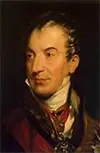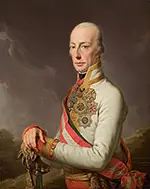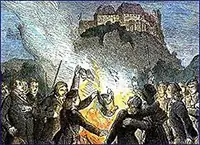Klemens von Metternich: Statesman Extraordinaire
Part 1: In the Shadow of Conflict Klemens von Metternich was foreign minister of Austria for nearly four decades, in the process shaping and reshaping much of Europe. 
He was born on May 15, 1773, in Koblenz, Germany. His father was Franz Georg Karl, Count of Metternich-Winneburg; and his mother was Countess Beatrix von Kageneck. Young Klemens grew up in the Rhine-Moselle region and later conducted his studies at the University of Strasbourg, earning a law degree there, and the University of Mainz. He went in 1790 to Brussels, then in the Austrian Netherlands, to be with his father, who was chief minister. By this time a statesman-in-waiting, he went on a diplomatic mission to Great Britain, in 1794. Returning to the Continent, he ended up in Vienna, returning to his studies. During this time, Austria–led by a new emperor, Francis II–, had gone to war with France. Metternich married Eleonore von Kaunitz-Rietberg in 1795. She was of high society, and their marriage afforded him access to the rich and powerful in Austria. Emperor Francis II took command of the troops when Austria again went to war with France. That, too, was a victory for the French. 
In 1801, Metternich won appointment as minister to the Saxon court; two years later, he was minister to Prussia. It was in the latter capacity that he lobbied hard for Prussia to join yet another coalition against France. Prussia declined, but Russia accepted, joining Francis, who had declared him Emperor of Austria in 1805, in again fighting against Napoleon Bonaparte. As before, France was victorious, largely because of the titanic Battle of Austerlitz. After this defeat, Francis abdicated the throne of the Holy Roman Empire, which ceased to exist. Austria remained, Francis having declared himself Emperor Austria in the meantime; and in 1806, Metternich became Austrian minister to France. He moved to Paris, where his family soon joined him. Metternich's task was to report back to his emperor on the continuing status of French stability in the wake of seemingly continual warfare. 
In 1809, Francis (right) attacked France again, while Bonaparte was distracted fighting the Peninsular War. The result was the same, with Francis having to agree to nearly humiliating conditions, joining the Continental System and agreeing to give his daughter Marie-Louise as the new wife of Bonaparte, who had annulled his marriage to his first wife, Josephine, in 1810. Metternich made an alliance with France in 1812, both Francis and Metternich meetin Bonaparte in Dresden in May of that year. A few weeks later, French troops began their invasion of Russia. Despite how that turned out, Bonaparte in 1813 turned down Metternich's Frankfurt proposals, which would have lost France control of much territory it still had at that point; the only benefit for Bonaparte, it seemed, was the retention of his crown, and so he rejected these proposals. Metternich tried for the better part of a year to put together some form of peace proposal, but the battles continued and so, in August 1814, Austria again declared war on France, joining the War of the Sixth Coalition. As it turned out, that war ended with the final defeat of Bonaparte, in 1815. A year before, the Congress of Vienna had begun. Metternich played a leading role in those discussions, which formally and firmly set Europe back on the road to peace and rebuilding. 
He carried on in this vein for the next few years, sounding the trumpet for continued peace through alliances. Among the imperial pronouncements were the Carlsbad Decrees of 1819, which enforced censorship of speech and the press. (Of special focus during this time was a series of student uprisings in the German states.) The emperor restored power to the Catholic Church. At the same time, however, he championed scientific advances, such as steam power and the railroad. Francis gave Metternich a free hand in creating what came to be known as the Metternich System, which championed autocracy at the expense of individual liberty; government troops marched to various parts of the empire to stamp out uprisings. Metternich spent the 1820s and 1830s shuttling between countries, trying to keep the peace, unsuccessfully in some cases. Wars broke out in the East, as Russia and the Ottoman Empire threatened to come to blows and Egypt and the Turks actually did, in 1831. A decade earlier, the Greek revolt had succeeded in an independent nation. Next page > Stability Elsewhere, Revolution Within > Page 1, 2 |
|
Social Studies for Kids
copyright 2002–2024
David White




